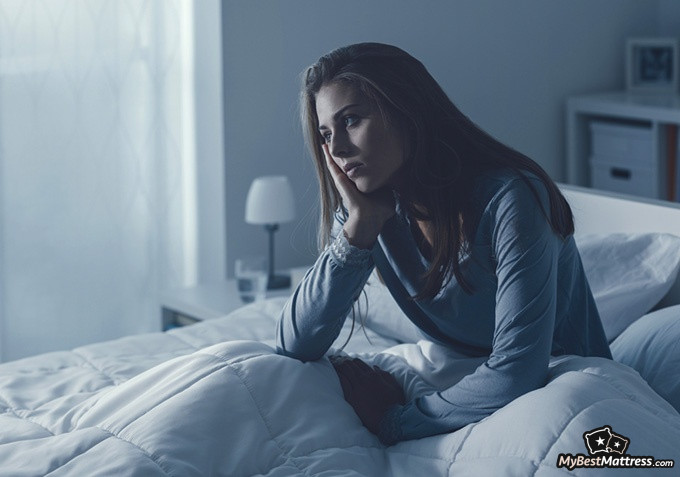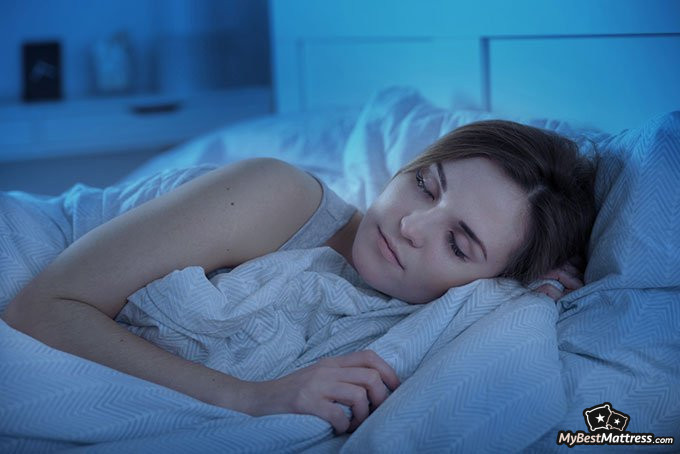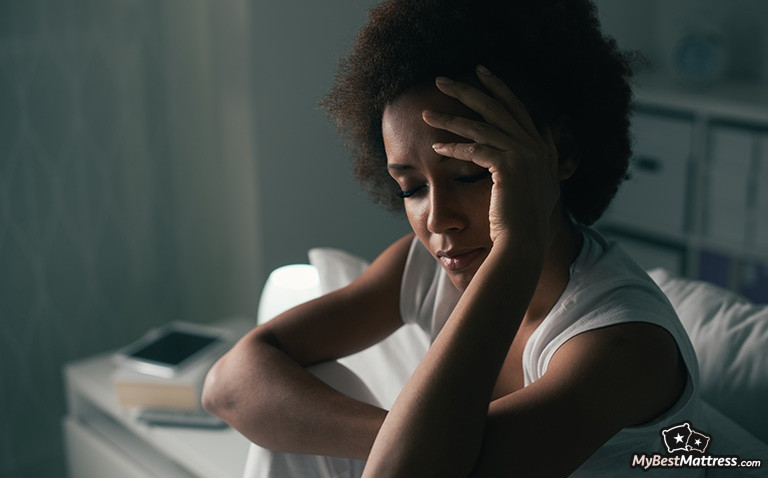
There are so many ways people try to treat insomnia. Some try medication, others meditate, others buy a new mattress or a pillow in hopes of sleeping better, while some people believe that counting sheep will eventually make them fall asleep.
However, there are still not that many people who recognize the power of using cognitive behavioral therapy for insomnia (CBT-I).
While CBT for insomnia is still not the first option people choose to try out to treat the ailment, it’s gaining more and more popularity with time. Is it worth it, though? Does cognitive behavioral therapy for insomnia work? Keep on reading to find out.
Table of Contents
- 1. What is Insomnia?
- 2. Causes of Insomnia
- 2.1. Stress
- 2.2. Disruption of the Circadian Rhythm
- 2.3. Poor Sleep Habits
- 2.4. Poor Sleep Environment
- 2.5. Medical Conditions
- 2.6. Stimulants
- 3. What is Cognitive Behavioral Therapy?
- 4. Cognitive Behavioral Therapy for Insomnia
- 4.1. Cognitive Restructuring
- 4.2. Stimulus Control
- 4.3. Sleep Restriction Therapy
- 4.4. Relaxation Therapy
- 5. Conclusions
What is Insomnia?
Before we get to the CBT for insomnia part, we must first talk about insomnia. Some people use this word very freely, describing any short-term inability to fall asleep quickly as insomnia. However, it’s important to understand what insomnia really is before trying to treat it.
Insomnia is classified as a sleep disorder that shows itself with symptoms such as finding it hard to fall asleep, hard to stay asleep, or waking up too early without being able to fall asleep.
Insomnia can be short-term or chronic. If it lasts for a few days up to a few weeks, it’s considered to be short-term. If it lasts longer than a month, then it’s considered long-term or chronic insomnia.
Causes of Insomnia
Insomnia can be caused by a variety of reasons. While sometimes it may seem that it appeared out of nowhere, there likely is a reason for that. So, you should definitely first check out the possible causes of insomnia.
Stress
The most common cause of insomnia is stress. There are so many things that can cause stress, the most common being work, school, health, and finances. Being stressed is not the most pleasant feeling by itself, but it can also be a cause of many illnesses.
Anxiety disorder can often be confused for simple stress. If you experience uneasiness for a prolonged time for no particular reason, or your anxiety and stress seem to be blown out of proportion, you might want to see a doctor to check whether or not you have an anxiety disorder.
Latest Saatva Coupon Found:
UP TO $500 OFF
Limited-time Saatva Sale
We're sharing a limited-time Saatva mattress discount with our readers! Grab this deal & enjoy your new mattress with huge discounts.
Disruption of the Circadian Rhythm
Another cause is the disruption of your natural circadian rhythm. Circadian rhythm is an internal, natural process that is responsible for regulating various functions along the day, the most important for us being regulating your sleep-wake cycle. It repeats itself every 24 hours.
It can be disrupted by many things. Some of the most frequently occurring ones are jet lag and irregular work hours. So, if you work very late at night and find it hard to fall asleep the next day, that is most likely because of your circadian rhythm getting out of balance.

So, if you have the possibility, you should try to keep your work as regular as possible and try to go to sleep and wake up at the same time every day in order to keep your circadian rhythm in check.

Did you know?
Have you ever wondered which mattresses are approved as the best for sleep?
See & compare TOP mattresses side by sidePoor Sleep Habits
Another possible cause of insomnia is poor sleep habits. It could be the aforementioned not going to sleep at around the same time every day, but it can also be a variety of other things.
One major factor that influences how easily we fall asleep is our screen time before sleep. Screens emit blue light, which stops melatonin production in your body. Melatonin is a sleep hormone that is responsible for making you fall asleep.
So the less melatonin you produce, the less sleepy you’ll feel. Therefore, you should definitely limit your exposure to the blue light if you’re struggling with falling asleep.
Poor Sleep Environment
One more factor that could greatly influence your sleep quality is your sleeping environment. You have to make sure you’re comfortable, there are no sounds around that wouldn’t let you sleep, and that there’s not too much light for your comfort.
Another factor that is vital for your good sleep quality is your mattress and sleep accessories. If you’re using an old uncomfortable mattress, it’s highly likely that you won’t sleep well. Therefore, if that’s the case, you should definitely check out our best mattress guide and choose a new one.
When it comes to sleep accessories, your pillow also has a great effect on your sleep quality. Your pillow could be old and uncomfortable, or it could cause you health problems because of dust mites. You should change it every 1-2 years.

If it’s time to change your pillow and you want to find out which one would suit you best, check out our extensive best pillow guide, or take a look at pillows for a certain type of sleep positions such as best pillow for side sleepers, stomach sleepers, or back sleepers.
Medical Conditions
Certain medical conditions such as chronic pain, cancer, asthma, and others that cause pain and discomfort can be a cause for insomnia. If you don’t feel comfortable, you likely won’t be able to sleep.
Another cause can be mental health problems. The most common ones are anxiety-related disorders. These can include Generalized Anxiety Disorder, Obsessive-Compulsive Disorder, Post-Traumatic Stress Disorder, and others of this kind. Anxiety is a very common mental illness affecting up to 1 in 5 Americans[1].
Those who struggle with anxiety often experience an increase of it at nighttime, when they’re not occupied with daily activities. Therefore anxiety can definitely lead to insomnia. Another disorder that could cause insomnia is depression. It usually leads to waking up early and not being able to fall asleep.
Stimulants
Have you gulped down 3 cups of coffee in the afternoon and are now wondering why you can’t fall asleep? It’s very likely that the primary cause of your insomnia is too much caffeine. Caffeine, which is found in coffee, many kinds of tea, and fizzy drinks, is a stimulant that prevents you from falling asleep.
Therefore, you should definitely keep your caffeine intake low and try to avoid caffeinated beverages past noon.

Another commonly used stimulant is nicotine. Nicotine, just like caffeine, can affect your body and prevent you from falling asleep. So, you should definitely avoid nicotine, especially before bedtime.
What is Cognitive Behavioral Therapy?
Cognitive behavioral therapy is a type of psychotherapy that’s commonly used to treat mental health disorders such as anxiety and depression. The main point of this type of therapy is to change the thought patterns, consequently changing the behavior.
There are several ways to change thought patterns in CBT. The first would be learning to recognize the distortions in your thinking, which creates distress in your life. The next one is getting to know other people’s thinking and motivation.
The third one is using problem-solving skills in difficult situations to help you cope with them. Other very common principles include facing one’s fears instead of avoiding them, using role-playing to prepare for a possibly difficult situation, and learning to calm down and relax your body.
The main point of CBT is to teach patients to be their own therapists. By changing their thought patterns into more positive ones and teaching them how to relax their body and see things in a better light, patients learn to tackle their everyday difficulties by themselves and not relying on a therapist.
Therefore, cognitive behavioral therapy usually doesn’t last for a long time, as those who have developed the necessary skills can practice by themselves.
Now, let's talk about cognitive behavioral therapy for insomnia.
Cognitive Behavioral Therapy for Insomnia
Now that you know what cognitive behavioral therapy is based on, it’s time to learn what CBT-I is and how it works. The cognitive behavioral therapy for insomnia works similarly to how it would if mental illnesses were treated. It still works on changing the thought pattern, which results in reformed behavior.
So, let’s see what steps are usually taken when cognitive behavioral therapy for insomnia is performed.
Cognitive Restructuring
Cognitive restructuring is needed because many people who suffer from insomnia already dread the time of going to sleep as they already expect that they’ll stay up for a long time without being able to sleep. Having this mindset creates huge problems and programs you to not fall asleep.
Common thoughts that are addressed in times of therapy are anxiety that the insomnia cycle will repeat, and you won’t be able to sleep, worries about daytime fatigue, and other insomnia-related thoughts and fears.

By doing this step of cognitive behavioral therapy for insomnia, a person breaks the habit of expecting not to sleep well, and they finally gain hope, which actually helps them deal with the problem of insomnia.
Stimulus Control
People tend to do lots of things from their beds. They scroll on their phones, watch movies, chat with people, and even eat. All this leads to not associating bed with what it’s primarily made for - sleeping.
Stimulus control helps to reclaim the association between bed and sleep. During cognitive behavioral therapy for insomnia, patients are urged to only sleep and have sex in bed. No scrolling on your phone, no reading, no movies, and no other things that so many of us tend to do in bed.
During this step of CBT for insomnia, clients are advised to only lie in bed for 10 minutes, and if they can’t fall asleep, they should get up and do something else, only to return to bed when they feel tired again. This way, they don’t have to deal with the misery of lying awake in bed and stop associating bed with this unpleasant feeling.
Sleep Restriction Therapy
Sleep Restriction Therapy is used because people who suffer from insomnia spend way too much time laying in bed, unable to sleep. It is used by first calculating how long you usually sleep nightly and then adding 30 minutes for falling asleep.
So, let’s say you only sleep 4 hours and 30 minutes a night. Then you should set your sleeping time as 5 hours. Ideally, you will be able to fall asleep fast when you go to bed. Once you achieve falling asleep at a reasonable time, you can start adding more time to reach a healthy sleeping time of at least 7-9 hours.

However, you should keep in mind that usually, insomniacs get too little sleep, and sleep restriction therapy doesn’t help with that. Therefore you might experience daytime fatigue.
Relaxation Therapy
As you’ve learned now, stress is the most common cause of insomnia. Relaxation therapy helps to deal with everyday stress, as well as insomnia-related stress. There are various ways to implement relaxation therapy.
One of the ways to do it is by doing breathing exercises. These mostly include taking deep, slow breaths and being mindful about your breathing. It’s been proven that taking deep, slow breaths can help with anxiety, stress, and depression[2], which are common causes of insomnia.
Progressive muscle relaxation is another type of relaxation therapy. As the name suggests, it is performed by tensing and relaxing specific muscle groups, which provides relaxation. It can be combined with breathing exercises.
Autogenic training is a type of relaxation therapy that focuses on the sensations. Those can be all kinds of sensations. However, they should be pleasant in order for you to relax and feel well before going to sleep. One of the objects that are often used is a weighted blanket, as it’s known to help people relax and reduce stress.
The last methods of relaxation therapy I’d like to talk about are hypnosis and meditation. These methods help you relax. Whether it’s a guided meditation, or hypnosis, after practicing them, you’ll be in a calm state. Also, it’s been proven that mediation has various health benefits, including reducing stress and anxiety.
Conclusions
Cognitive behavioral therapy has been proven to be effective for insomnia. While there are still many people who opt for the medicine to treat their insomnia, CBT-I is gaining popularity rapidly.
Insomnia can be caused by various factors such as stress, stimulants, bad sleep environment, bad sleep habits, too much screen time, etc. Adjusting them and trying out CBT for insomnia will likely help you combat it.
If you haven’t been sleeping well, it’s highly likely that you need to change your mattress or a pillow in order to sleep better. To do that, check out our best mattress guide and our best pillow guide.
Scientific References
1. National Institute of Mental Health "Any Anxiety Disorder Statistics"
2. Andrea Zaccaro, Andrea Piarulli, Marco Laurino et al. "How Breath-Control Can Change Your Life: A Systematic Review on Psycho-Physiological Correlates of Slow Breathing"
Leave your honest feedback
Leave your genuine opinion & help thousands of people to choose the best mattress. All feedback, either positive or negative, are accepted as long as they’re honest. We do not publish biased feedback or spam. So if you want to share your experience, opinion or give advice - the scene is yours!













